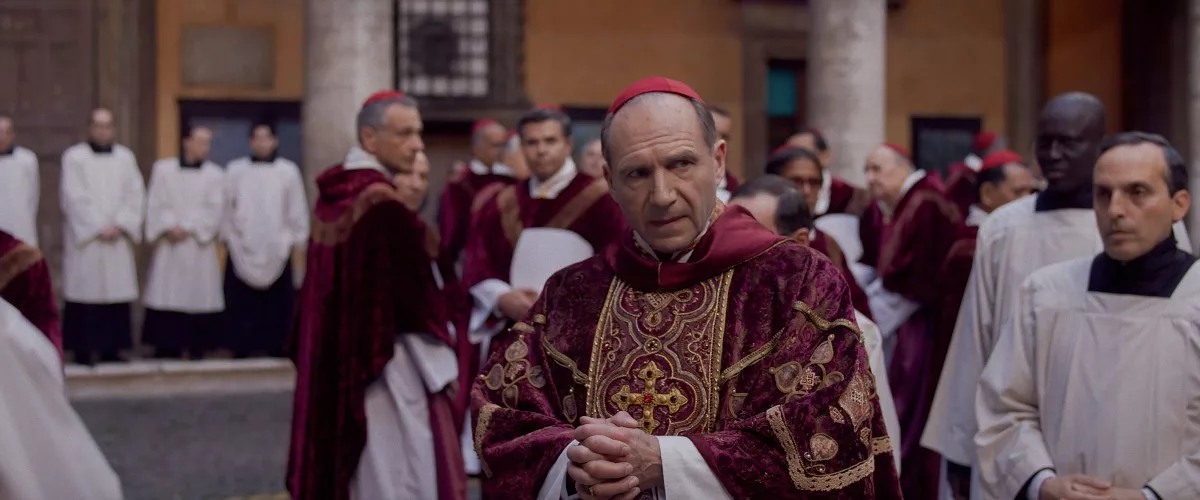
I know what you’re thinking: A movie about a group of Cardinals electing a new pope? Do you have any paint I can watch dry while you’re at it?
But what if I told you that Edward Berger’s Conclave was one of the most exciting and best films of the year—a tense and beautifully shot procedural filled with intrigue, surprise twists, double-crosses, and almost incalculably high stakes.
Early in the film, the stage is set. The pope has died and while many high-ranking clergymen fuss over his death bed, only one seems to truly be in mourning. That’s the Dean of the College of Cardinals, Thomas Lawrence (Ralph Fiennes), whom we find out later had recently tried to resign his post—without success. Maybe the pope knew he was going to die, Lawrence speculates, and he wanted someone he trusted running the conclave.
A conclave, for the uninitiated, is a special election of a new pope by the Cardinals. That deal with the smoke billowing out of the Vatican until we get a new pope? That’s the conclave.
And if you think it’s a peaceful and stress free process, may I direct your attention to HBO’s Succession?
Four candidates emerge early on. There’s Stanley Tucci’s Bellini, the self-described liberal of the group, who wants the Catholic church to continue its progress on social issues. There’s Adeyemi (Lucien Msamati), who would be the first Black pope, but has some skeletons in his closet. There’s the entertainingly loathsome Tedesco (Sergio Castellitto), who vapes like he’s in some South Beach nightclub and believes that the Catholic Church should regress to its traditional ways—Latin liturgy, no women in the church, no gay marriage. (Tedesco makes the mistake of assuming Lawrence shares his values. When he casually mentions what a disaster it would be if Adeyemi becomes pope, Lawrence radiates with visible disgust.) Finally, there’s the seemingly mild-mannered Tremblay (John Lithgow), the moderate choice—but what to make of the rumors that the pope asked for his resignation shortly before he died?
As Dean, it falls on Lawrence to oversee the conclave, but there is a complicating factor—the cardinals are in lockdown, and therefore he has no access to outside information that might help him get to the bottom of the various rumors.
The first of many votes comes in and there are a few surprises: For one, Lawrence gets a few votes, even though he made it clear he wasn’t interested. Adeyemi is in the lead, with the other three main contenders fairly far behind. And there’s an even a more surprising vote bringing up the rear—for the humble Benitez (Carlos Biehz), a newcomer to the Vatican who had been serving a dangerous Catholic ministry in Afghanistan and had been secretly made a Cardinal by the pope.
The similarities to American politics, to all politics for that matter, are strictly intentional. Tucci’s Bellini pretends to be a reluctant candidate, but secretly craves the job. Tremblay is so blinded by ambition, he’s lost his moral compass. And as for Tedesco, his motto may as well be, “Make the Vatican Great Again.”
All the cardinals are so grasping they can hardly believe that Lawrence means it when he says he doesn’t want to be pope. They accuse him of secret ambition and sabotage, when he’s actually only seeking someone worthy of the job. (That said, he does have a papal name picked out: John. It’s that old aphorism about American politics: “Something happens to a man when he looks in the mirror and sees a president.”)
Although I was a fan of Edward Berger’s All Quiet on the Western Front, I found its score a little jarring (intentionally so, but still…). Here, the jangly and stuttering sounds of a string quartet perfectly enhance the tension. The film is shot beautifully in a recreated Vatican—all long halls, secret chambers, and light-filled sanctuaries. (The film’s recreation of Sistine Chapel is impeccable.) But there’s a sense of claustrophobia, too. The cardinals are perfectly cloistered. It might as well be the 17th century up in there.
All the acting is top notch—Castellitto in particular is a riot—but Ralph Fiennes is nothing short of masterful as Lawrence, a good man caught in the maelstrom of these red-robed men and their outsized ambition, all while grieving the pope and suffering his own crisis of faith. And look for a quietly powerful Isabella Rossellini as the all-seeing and all-knowing Sister Agnes.
Conclave is gripping from beginning to end. It’s one of those movies that reminds you why you love movies.
